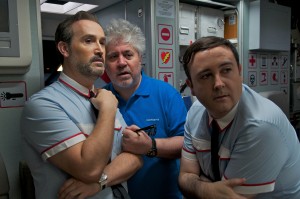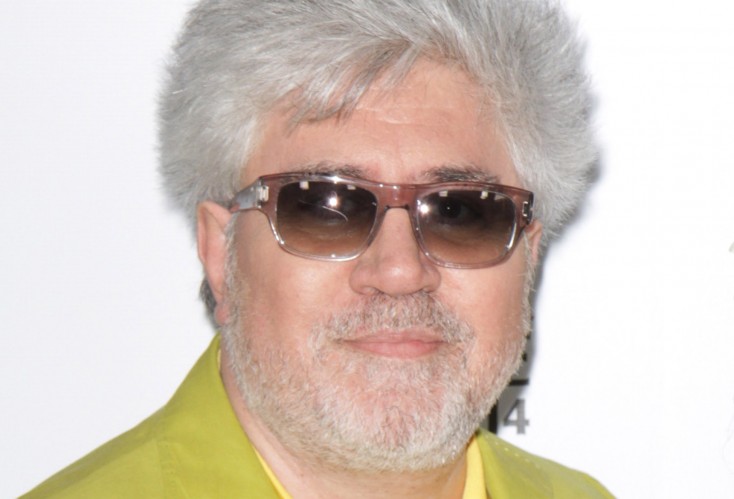
Left to right: Javier Cámara, Pedro Almodóvar and Carlos Areces in “I’m So Excited!” ©Sony Pictures Classics. CR: Paola Ardizzoni/Emilio Pereda/ Sony Pictu
By ANGELA DAWSON
Front Row Features
HOLLYWOOD—Pedro Almodovar is one of those rare directors whose Spanish-language films are warmly welcomed outside his home country, even in the subtitle-averse U.S. “Women on the Verge of a Nervous Breakdown,” “Tie Me Up! Tie Me Down!” “All About My Mother,” “Talk To Her,” “Bad Education” and most recently “Volver,” have successfully crossed the Atlantic and performed well (compared to other foreign-language films).
What’s the secret of this 63-year-old filmmaker’s universal success? Aside from casting Penelope Cruz and Antonio Banderas in many of his films, Almodovar is known for creating interesting, complex stories. They often revolve around family relationships and sexual tension and incorporate irreverent humor and pop culture references.
His latest film, “I’m So Excited!”, a comedy set aboard a Mexico-bound passenger jet in mechanical trouble, may be his most subversive comedy yet. On the surface, it’s a bawdy romp about three very fey male flight attendants, the cockpit crew and their first class passengers—everyone in coach has all been drugged—cope with the aircraft’s pending doom. But it also has underlying and pointed political, economic and social overtones.
The renowned filmmaker, distinguished by his wild grey hair and larger-than-life personality, recently spoke about his newest work, what inspired him and what he hopes audiences—both in Spain and around the globe—will take away from the movie.
Q: This is much more of a farce than your previous movies. How was it having these gay actors playing over the top gay flight attendants?
Almodovar: The actors (Javier Camara, Carlos Areces and Raul Arevalo) are not gay, I have to tell you. They trained very hard over a long period of time to get as flamboyant and queenie as they became in the film. The thing with this movie is it is the first time I’ve had three very effeminate, queenie characters. In the past, I didn’t need to put in any specifically gay characters in my movies because, for me, being gay is something that’s completely regular. So that’s why I didn’t have obviously gay characters in my past films. For this specific movie, a light comedy, I think the queeniness, the flamboyant quality, was funnier. Also, these characters serve as kind of the masters of ceremonies of everything that’s happening. I needed something very precise about these effeminate characters. So it was a result of their wonderful work.
Q: How would you describe this film in general terms? Is it political, sexual or bisexual?
Almodovar: It depends on the audience. In Spain, everyone recognized that this is a specific reality. The film is a clear metaphor of Spanish society about the uncertainty we feel. The emergency landing is very risky. We don’t know how it will come out. I’ve said in Spain and France that they are close together and need each other. I don’t say that here because I cannot expect people to know what is happening in Spain (economically and socially). I’m trying to just make a fun movie. It’s like I’m doing burlesque. The movie is a comedy but it’s also about fear and loneliness. The fact that (the plane’s passengers and crew) are not connected to anything, this is contemporary loneliness. They are condemned—for better or worse—to be with each other. The best thing for them to do is to talk. Talking is the best thing to entertain themselves, so they can forget about fear. It’s a movie where death and sex is very present.
Q: Can you talk about the inception of the screenplay? Did any of this come from your own personal experience flying?
Almodovar: I didn’t have sex in a plane. I dream of that sometimes. Not lately. I didn’t do drugs on a plane; I think it’s the only place that I didn’t. (He chuckles.) It was very popular in Madrid in the 1980s. I also don’t drink. This is something I never did, even in the 1980s. But the main thing is all these things are prohibited. The comedy is meant to betray the rules. Basically, these people are frightened, nervous and becoming crazy, and so they drink alcohol to relax. All of this is linked to the ways in which they can let go of their inhibitions, to some level because of the drinking and the state of excitement, but also because they’ve forgotten what’s at the base, which is the fear. For a bunch of passengers who are facing death, this is one way to celebrate life—to turn to the senses, specifically sexuality and sex, to say goodbye to life.
Q: Do you like the translation of the movie title from “Los Amantes Pasajero” to “I’m So Excited!”?
Almodovar: We needed that translation, because here (the Spanish title) doesn’t have the same meaning as it does in Spain. It means someone is traveling and something is fleeting. In France and Italy, it had the same title but here we needed a new title. So here “I’m So Excited!” is good for this type of movie. In Spain, to be excited also means to be horny.
Q: Did you write the role of Norma, the gossip column writer passenger, specifically for veteran Argentine actress Cecilia Roth? What did she say when you offered her the role?
Almodovar: I actually didn’t of her when I was writing the script. In fact, this was one character that I didn’t get the actress I had expected. Originally, it was written for someone older than Cecilia. She was supposed to be around 63 (Roth is 56), good-looking and had undergone a lot a surgery. She was like the madams I had in mind from Spain. I remember the type of actresses who used to work in (the late 1970s), when there when there was the sexual revolution going on. Censorship was lifted. I realized there were actresses in Spain that could play that role but they were not right for the part. They had the physical requirements of the role but they were not right for the part. So I decided to adapt the role for Cecilia. Also, there’s a phenomenon of after the (Franco) dictatorship (was over), an invasion of Argentine artists came to Spain. Cecilia was just the opposite of the type of actress I’d originally thought of. She was just the typical model girl. She’d done important, very interesting movies in the early 1980s. This is an actress I’d admired very much. She grew up after living in Madrid in the 1980s. We started (our careers) at the same time and I was very proud of her.
Q: You won an Oscar with her?
Almodovar: Yeah. For “All About My Mother.” (Best foreign language film at the Academy Awards in 2000.)
Q: What was it like to win the Oscar?
Almodovar: To win an Oscar is always wonderful. (He chuckles.) But there were so many things to do before that. You have different parties every day. So by the time you go to the show, you’re exhausted! (He chuckles some more.) No, it is wonderful. I didn’t work just to get an Oscar. It was like this one: I just wanted to make a movie. For me, my ambition is for the audience to identify with the movie. For the good things and the bad things. Of course, (“All About My Mother”) is kind of unique. In Spain, before me there was only one other Oscar (winner). There is a moment you get when your mind just blows. You have a moment of extreme happiness, and then you just return to reality.
Q: Did you hesitate to have a reference to the current problems of the King of Spain in the movie? Do you have any comments about the scandal that currently is rocking the royal family? (Princess Cristina has been indicted on charges of complicity in fraud, tax evasion, money laundering and embezzlement in connection with charges filed against her husband.)
Almodovar: I don’t want to give more problems to the king than he already has. My opinion of (the Spanish royal family) has changed in the past two years. It started to change when a book about the king (“The Solitude of the Queen” by Pilar Eyre) came out (in 2012). The queen was so discreet (about her husband’s alleged infidelity) over the years. We used to think was because she was intelligent. I was disgusted to discover his homophobia and opposition to gay marriage. I’m very unsatisfied with that as well as the case of corruption that the royal family has. The Spanish people are mature enough to talk about it now. Everyone (in Spain) talks about it every day. What we need is more collaboration in what happens in our lives. I think we should have a right as Spaniards to ask for a referendum regarding what the opinion is about whether we should have a parliamentary monarchy or not. I have empathy for the king, though. The (royal family) was very nice to me, always. I don’t want to give them a problem with this but everybody thinks that the king has had many love affairs, and so felt it was OK that I could imply it in the movie—though no one actually says it. It was just funny to do that.
Q: Would you have any interest in adapting “I’m So Excited!” for the stage or as a continuing TV series?
Almodovar: I think this film very immediately could be adapted into a play because there of the way it is set up and the way I use the three characters in a very theatrical way. They can sing and dance. So I’m waiting for someone to demand the rights because I wrote this like a theater play. When I think of the screwball comedies of the 1930s and 1940s, most of them were based on plays.
Q: How did you come with the idea of Antonio Banderas and Penelope Cruz playing the ground crew for the opening sequence of the movie?
Almodovar: It was because I wanted to be with them. We enjoyed working together even though it was only for one day. Also, this is my return to a genre that is familiar to me. My earlier movies were comedies so I came back to that genre. My idea was to have two actors that belong to my family. They’re part of my artistic and emotional family. They are basically welcoming the audience to the new movie of Pedro. He’s going back to comedy. It’s kind of like a feeling of something familiar.
Q: Were you angry with Antonio when he came to Hollywood several years ago?
Almodovar: No! Absolutely not! Always, Antonio and Melanie (Griffith, his wife) were for me like my American family. I only was angry once with a Mexican actor but I won’t say who that was. That’s in the past. Antonio always has invited me to his plays and I stay with him when I come here (to the U.S. to visit).
Q: So many people admire you as a filmmaker. What directors do you admire?
Almodovar: I admire many directors and many writers. When I think of directors, I have hundreds of them. Since this business was invented, there have been so many people that were full of talent. As for the makers of classic screwball comedies, I’m a big admirer of all the writers and directors of the 1930s and 1940s like Ernest Lubitsch, Billy Wilder, Preston Sturges, Mitchell Leisen and George Cukor.
Q: Any Spanish directors?
Almodovar: Yes, of course. Luis Buneul and, I don’t know if you are familiar with Luis Garcia Berlanga. His “El Verdugo” (“The Executioner”) is an absolute masterpiece.





